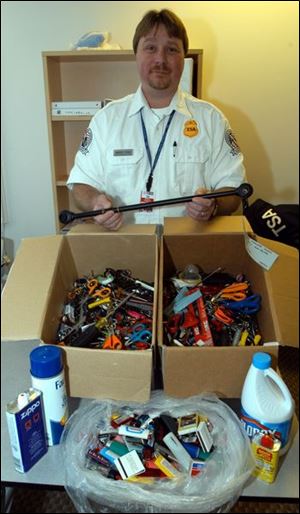
Nail scissors lead list of seized items at Toledo Express
4/14/2003If the two bins in a locked room at Toledo Express Airport are any indication, local drugstores ought to be selling a lot of nail scissors these days.
That's because several people boarding planes at the airport have had theirs seized in recent months when they tried to take them through the security checkpoint in carry-on bags.
“A lot of times, they just don't realize they've got [a banned item],” said Robert Turay, the Transportation Security Administration's security director at Toledo Express.
“Either they forgot it was in their bag, or they didn't check to see what was allowed.”
Although tiny scissors may be the most common item among the potential weapons that security screeners have seized, by weight they probably account for less than half of the 120 pounds of objects in the collection at Toledo Express.
Among the heavier items: a five-pound tie rod for a Volvo - a salesman's sample that Bruce Schneider, the TSA's local assistant director, said the salesman did not want to check, so he had to leave it behind.
And scattered throughout the heaped scissors of various sizes and a wide variety of pocketknives are such other odd items as a lighted fluorescent hammer, a bullet attached to a chain, a plastic-handled steak knife, an eight-unit screwdriver set, assorted wrenches and pliers, and even a few box cutters and straight razors.
“We get these things particularly from folks who haven't flown in a long time,” Mr. Turay said.
Purses and handbags are the most common source of banned items, he said. “It's surprising what you'll find in people's purses.”

Mickey Thompson, a Toledo Express Airport screener, displays the banned items seized from airplane travelers.
So far, the security director said, no one has admitted to deliberately trying to take a banned item aboard a plane.
The box cutters - the sort of object that the Sept. 11, 2001, hijackers used to kill or incapacitate flight and cabin crews - were probably forgotten in a pocket after a traveler left a factory or warehouse where he or she needed them, he said.
What exactly will happen to all this stuff remains to be determined.
A published report from Grand Rapids, Mich., said authorities there expected to conduct an auction sometime later this year.
That possibility had attracted a fair amount of interest from travelers who had surrendered personalized items, such as monogrammed pocketknives, at the airport.
Not so fast, federal officials said last week: Although arrangements are to be made with state surplus-property agencies across the country to handle future disposal of seized items, no action has yet been taken in either Michigan or Ohio.
“We're just kind of in limbo at the moment,” said Ed Martelle, a Transportation Security Administration spokesman in Dallas.
The TSA will turn seized items over to the General Services Administration, which in turn will make the arrangements with the states, Mr. Martelle said.
“In California, the state is re-selling these things on eBay, and splitting the proceeds with us,” he said.
In Ohio, the agency most likely to end up on the receiving end is the Department of Administrative Services, which conducts surplus-property auctions from time to time.
Along with the state's used furniture and vehicles, spokesman Ben Piscatelli said, the department occasionally sells off items forfeited to the state during law-enforcement proceedings.
That's where “our most unusual stuff comes from,” he said.
But Mr. Piscatelli said he was unaware of any contacts about handling airport-seized property.
The TSA took over security at Toledo Express in September, and Mr. Turay said a first batch of banned items seized during the agency's first few months was destroyed early this year.
Mike Conway, a spokesman at Detroit Metropolitan-Wayne County Airport, said items confiscated at the checkpoints there also had been destroyed.
Few are likely to want to buy someone else's old nail scissors, but a few of the pocketknives and a lot of the tools in the bins at Toledo Express looked like they might have some resale value.
Forfeitures at Toledo Express dropped off substantially early this year when checked-baggage screening began, Mr. Turay said, because that process gives TSA staff an opportunity to remind passengers to inspect their carry-ons for banned items.
Bruce Schneider, the Toledo security station's assistant director, noted that passengers can choose to take banned items back to their cars, or even mail them to themselves.
But nothing on the banned list, which is posted in full on the www2.faa.gov Web site and includes scissors, knives, razor blades, screwdrivers, ice skates, baseball bats, saws, and a host of other things that could be construed as potential weapons, will be allowed on planes.